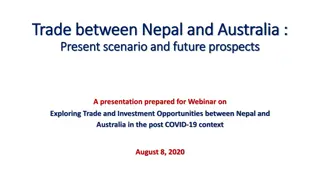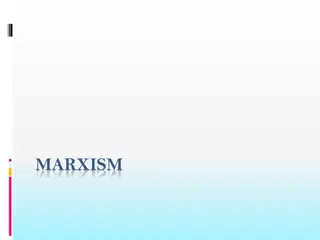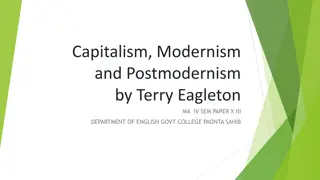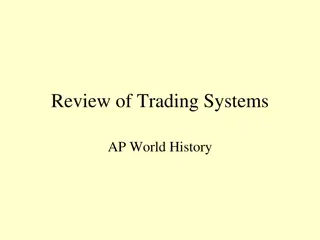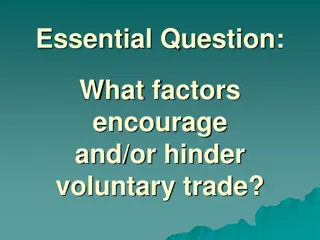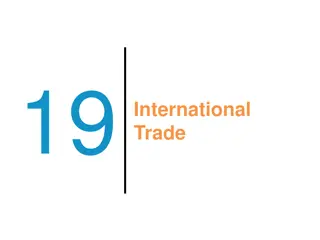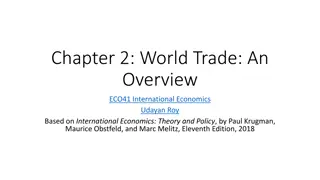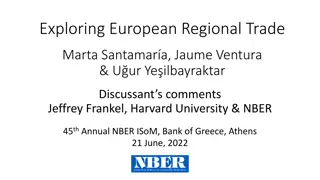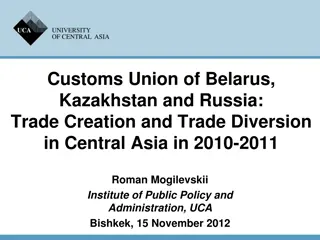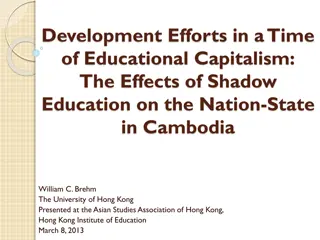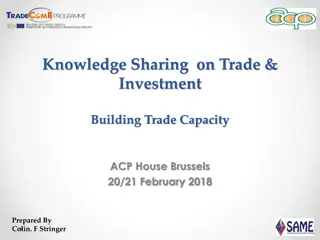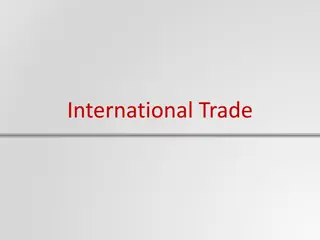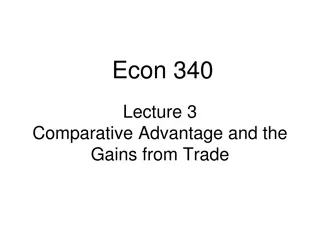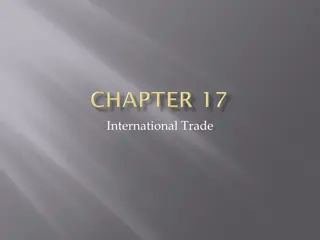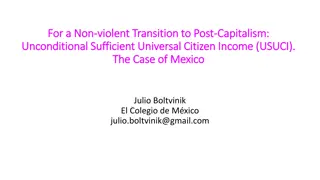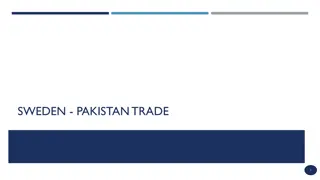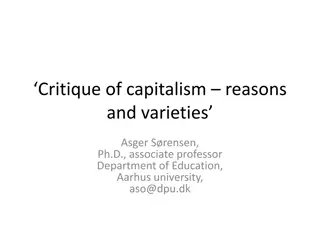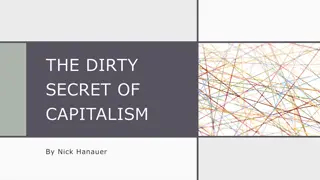The Emergence of Capitalism and Global Trade Dynamics
European expansion from the 15th century onwards saw the rise of a commercial network on a global scale, driven by a blend of economic interests and political power. The capitalist system evolved through strategic trade, market expansions, and a regional division of labor. The movement of goods and communication routes were dominated by European powers through economic domination, shaping the modern world system linked by exchange relations. The capitalist world economy emerged around 1500, coinciding with the expansion of commerce and state-imposed specialization of production.
Download Presentation

Please find below an Image/Link to download the presentation.
The content on the website is provided AS IS for your information and personal use only. It may not be sold, licensed, or shared on other websites without obtaining consent from the author.If you encounter any issues during the download, it is possible that the publisher has removed the file from their server.
You are allowed to download the files provided on this website for personal or commercial use, subject to the condition that they are used lawfully. All files are the property of their respective owners.
The content on the website is provided AS IS for your information and personal use only. It may not be sold, licensed, or shared on other websites without obtaining consent from the author.
E N D
Presentation Transcript
From the fifteenth century on, European soldiers and sailors carried the flags of their rulers to the four corners of the globe, and European merchants established their storehouses from Vera Cruz to Nagasaki. Dominating the sea-lanes of the world, these merchants invaded existing networks of exchange and linked one to the other. In the service of God and profit they located sources of products desired in Europe and developed coercive systems for their delivery. In response, European craft shops, either singly or aggregated into manufactories, began to produce goods to provision the wide-ranging military and naval efforts and to furnish commodities to overseas suppliers in exchange for goods to be sold as commodities at home. The outcome was the creation of a commercial network of global scale. Eric Wolf, A People Without History
The rise of capitalism Did not just emerge out of nothing Traceable trends in global markets and the colonization process Ecological, cultural, social costs of doing business The global spread of conspicuous- consumption oriented capitalism has been both a blessing and a curse
About four or five hundred years ago, the movement of goods and global communications became dominated by a small peninsula off the landmass of Asia While European powers certainly used political and military power to extend their control, it was accomplished through economic domination of trade and market expansion.
Image from http://www.allthingsdistributed.com/2008/12/amazon_ec2_in_europe.html
The Modern World-System, 1974 Looked at how the capitalist systems penetrated non-capitalist systems A binary distinction between the core area and the peripheral area Argued that world economies linked by exchange relations were largely impossible before about 1500
The capitalist world economy, which appeared around 1500, coincided with the expansion of commerce The states of Northwestern Europe were able to impose a regional division of labor and specialization of production - e.g. sugar in the Caribbean, bullion in the Andes, and cereals in Eastern Europe
Through increasingly powerful state bureaucracies, European powers continued to consolidate the flow of surplus toward the core countries The world system theory urges us to examine the history of cultural conflicts to understand the change in any given cultural area
Eric Wolf Europe and the People without History (1982) A Critique of Civilization as a response to appeals from indigenous peoples to seek out the actual nature of the roots of the exploitative and oppressive conditions which are forced on humanity Wolf emphasized the importance of the social relations that structured the organization of production and the distribution of goods and labor within and between societies
In his view, the motor for the rise of international capitalism was located in the West, and the system itself was built on exploitation, enslavement, genocide, and the formation of class structures and states It also involved ethnogenesis - the creation of peoples without history both inside and outside Europe
What did Wolf mean by this statement? People living at the margins of history People who live outside of the Western European historical timeline But also those who live within the history of the West but in a marginal or subordinate position "People Without History refers to those peoples whose cultures lack a formally written articulation of their histories
Returning to RobbinsWhere are we today? Corporations have the same economic rights as citizens Governments are opening markets economically and militarily Nation states maintain armies to protect investments Governments, educational institutions, and the media encourage consumers to spend These are the conditions of doing business
For most of human history we lived in small, relatively isolated communities Until 10,000 years ago we were all foragers Then came agriculture, longer work hours, harder labor However, additional labor maintains denser populations Populations continued to increase
The major way in which human beings organize their production The concept of mode of production aims at revealing the political-economic relationships that underlie, orient, and constrain interactions in a society (Wolf 1982: 76) Kin-ordered Production and consumption organized through kinship May be real or fictitious kinship May or may not serve to restrict access to resources
Tributary the laborer has access to the means of production with the obligation of tribute to a lord or a ruling elite labor is mobilized and committed to the transformation of nature primarily through the exercise of power and domination (Wolf 1982: 80) Capitalist the laborer is separated from the means of production, access is mediated by elite owners came into being when monetary wealth was enabled to buy labor power for labor power to be offered for sale, the tie between producers and the means of production had to be severed for good (enclosure movement in Europe)
Historically specific: did not exist in 1400 Private ownership of the means of production (bourgeoisie) Distribution of goods controlled in a mainly market economy People without means of production must become laborers (proletariat) Development of capitalists class All or most of the inputs and outputs of production are supplied commercially through the market
The merchant, industrialists, and financier Person who controls the capital, employs the laborers, and profits from the consumption of commodities
Like Wolf in Europe and a People without History Robbins starts our trip at the year 1400. Why? This is the time pointed to by Wolf and others as the beginning of the rise of modern capitalism
To understand how did the distribution of wealth change, and how did one area of the world come to dominate most others economically? How and why did these transformations in the organization of capital come about? How did the level of global economic integration increase, and what were the consequences for the merchant adventurer, as well as others?
What was the world like for such a person in 1400? World population at 250 million The largest trading city in the world was Hangchow Major market-places Major concentration of global traders Major ports for the movement of goods Major overland trade routes to markets in Euro-Asia
Most political rulers in the 1400s still relied on a tributary mode of production Most did not encourage trade While states valued the money garnered from merchant-capitalists, they were still viewed with distain Why? Threat to the aristocracy
No consumer economy yet World population lived on subsistence economy (i.e. they produced what they needed) No major currency across Europe, especially not globally China and India richest states Possibly no major areas of poverty
China withdraws A traditionalist movement, possible response to cultural intrusion of the West Trade expansion through exploration Voyage of Vasco da Gama around the southern tip of Africa, the discovery of the New World The rise of new navel powers such as Portugal The huge growth in the world economy and the amount of currency in circulation
Massive wealth extracted extremely quickly Massive die off of native populations Population size? 8.4 million? 50- 100 million? (p. 49) Not an unoccupied wilderness, but rather a complex social arena
Some hard numbers Population of Tainos in Espanola (Haiti/Dominican) at contact (1496): 8 million? Population in 1514: 22,000. Population in 1542: 200 By 1552 all Tainos people in Espanola where extinct 95 to 98 percent of the indigenous population died as a consequence of European contact (p. 50 )
How did the collapse of the native population lead to an increase in the slave trade? Profitable, driving commerce in the New World Helped to develop the plantation and ranchero systems Environmentally destructive
By the 1600s, states began to become more involved in global trade and commerce Trading companies were very powerful Dutch East India Company British East India Company Created massive wealth for the parent countries Aided the spread of capitalism
1800, England becomes dominant over rest of European powers Lost of American colonies offset by the colonization of India Rise of industrialism in England Iron production increases Development of the steam engine Development of the cotton gin
Increase in demand for goods Increase in the supply of capital Growth in Population Expansion of Agriculture An English Spirit Entrepreneurial spirit, Protestant ethic State support of trade The rise of a merchant class A change in consumption patterns Introduction of sugar, coffee, tea, etc
A new pattern of capital formation Money is converted to commodities that combine with the means of production and labor power to produce other commodities that are then sold for a greater sum than the initial investment
Requires labor force removed from access to means of production As long as people have that access, no need to sell their labor State sponsors restriction of access to means of production Those who control the means of production also control the goods created Thus labors must not only sell their labor to gain wages, but they must also purchase the products of their labor to survive AND HERE WE ARE!!
Capitalism necessarily requires growth Production requires capital Production expands Thus rise of Imperialism Imperialism Colonialism seen as necessary for growth and stability Unequal exchange: colonies (individuals, states, etc) produce only raw materials and must import finished goods at a higher overall cost
Power no longer in ownership of land, but rather in the control of capital New elite made up of bankers, aristocracy, businessmen, manufacturers, and jurists, among others, held together through newly developed kinship ties Capital kept within families!!!
Massive consolidation of industry lead to the development of huge companies dominating the market European and American powers act to divide up influence zones Corporations acting as extensions of capitalism Are they becoming the dominant governance units in the world?
A social construction of the state Allows private financial resources to be used for the state Allows individuals to apply massive economic and political power to accumulate wealth Publicize Risk/Privatize Profit Corporate charters represented a grant from the government that limited an investors liability to losses covering the amount of the original investment
Corporate law at the time was focused on protection of the public interest Not on the interests of corporate shareholders Corporate charters were closely regulated by the states Forming a corporation usually required an act of legislature Investors had an equal say in corporate governance Corporations were required to comply with the purposes expressed in their charters
Fear of the power of corporation in the United States led to limits being placed on their development Post Civil War America Corporations made huge profits during the war, able to influence political process Resulted in corporate land grabs, development of infrastructure Consolidation of power and wealth continued
Because of this growth in power Corporations eventually gain corporate charters into perpetuity Reduce liability of owners (accidents) Gained the right to operate in any way not legislated AGAINST Restricted minimum wage laws Restricted work day legislation
In the early and mid 1800s, (1819 first ruling) the U.S. Supreme Court granted corporations a plethora of rights they had not previously recognized or enjoyed Santa Clara County v. Southern Pacific Railroad Company, 118 U.S. 394 (1886) was a United States Supreme Court case dealing with taxation of railroad properties. The case is most notable for the statement that corporations are entitled to protection under the Fourteenth Amendment
The Fourteenth Amendment to the Constitution, which forbids a State to deny to any person within its jurisdiction the equal protection of the laws, now applies to corporations
Corporate charters were deemed "inviolable," and not subject to arbitrary amendment or abolition by state governments The Corporation as a whole was labeled an "artificial person," possessing individuality, immortality, and most importantly freedom of speech What does freedom of speech allow a corporation to do?
Corporations are granted the same protections an American citizen has Freedom of Speech The ability of corporations to lobby legislatures with the same rights as citizens The growth in corporations use of the media to lobby consumers Massive influence of corporations in government
Proponents of corporate personhood believe that corporations, as representatives of their shareholders, were intended by the founders and framers to enjoy many, if not all, of the same rights as natural persons, for example, the right against self-incrimination, right to privacy and the right to lobby the government.
Opponents claim that certain rights of natural persons, such as the right to political and other non-commercial free speech, are now exercised by corporations to the detriment of the American democratic process as provided under the Constitution.
This of course led corporations to create conditions where they could make greater profits Eventually placed the rights and freedoms of the corporation over those of the individual The corporation came to exist as a separate entity with its own internal logic and rules
Western Capitalism is natural, teleology (result of all prior action) of human progress Humans are naturally greedy, although the poor are lazy and stupid The poor therefore require masters and no savings to force them to work Economy is disembodied from socio-political structure, operates according to abstract principles Free market for labor and resources to sort themselves out by supply and demand
Governments dont interfere in the market except to provide basic necessities to the lazy poor, while the picked-on wealthy, who are our benefactors, pay all the taxes but get nothing in return (vs. supporting investments in military, communications, transportation, etc.) The wealthiest are those who sacrifice, work the hardest, and are entrepreneurial Hard work = wealth = God s providence, favoritism People have equal opportunity to accumulate wealth
Colonialism was for civilizing the savages or for saving oppressed people from totalitarian archaic states Peripheral peoples are poor because racially or culturally inferior, not because colonized and exploited Major capitalist countries are the most civilized , promoting peace and human rights The UN, World Bank, and IMF are philanthropic, development-oriented institutions
Capitalism = democracy, with the most important decisions made by the masses Economic Growth means betterment for all; and when wealthy do well, all do well Standards of Living rise with global capitalism, and standard of living is the same as quality of life Science & Industrial Revolution spurred capitalist growth, not vice versa Humans vs. Nature: Human can dominate their natural surroundings and growth knows no limits If not free market capitalism, the only alternative is godless communism
As corporate libertarianism expands International Bank for Reconstruction and Development Allowed development of markets in periphery countries The International Monetary Fund Allowed currency exchange on a global level General Agreement on Tariffs and Trade Created a forum for nations to negotiate trade policy that eventually lead to The World Trade Organization Global forum for trade agreements Intended to level playing field but benefits wealth elite who drive the negotiations


